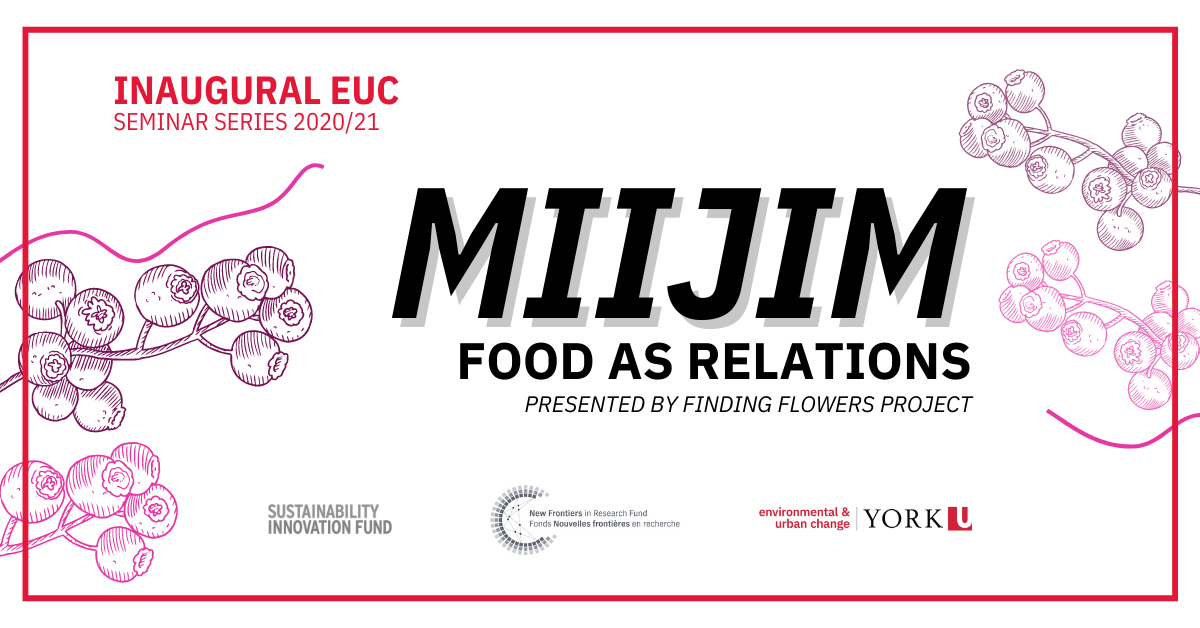
MIIJIM: FOOD AS RELATIONS
MIIJIM was a 2020-2021 series of online conversations presenting Indigenous, Black and People of Colour food scholars, growers, earthworkers, artists, curators, professors, knowledge keepers and advocates who gathered virtually across Canada. The word miijim is an anishinaabemowin word that broadly means food. The relational aspect of food became the premise of this series, and guided our format as a conversation series as a methodology and approach to engaging our guests. The series brought together 22 diverse thinkers and makers to discuss the interconnections between art, earthwork, cultivation and harvesting experiences that decenter colonial frameworks, while thinking through labour and power relations related to food justice in urban and rural communities.
MIIJIM was the 2020-2021 Faculty of Environmental and Urban Change (EUC) Inaugural Seminar series and it was partially funded by the Government of Canada New Frontiers of Research Fund, York University’s Sustainability Innovation Fund, and EUC.
October 6, 2020
MIIJIM: Indigenous Food Sovereignties
This conversation brought together Secwepemc artist, curator and co-creator of Bush Gallery Tania Willard in conversation with Dawn Morrison (Secwepemc), Founder and Research Curator of the Working Group on Indigenous Food Sovereignty, and Mi’kmaw professor and Indigenous land and food justice advocate Sherry Pictou, to consider their work in defence of Indigenous sovereignties, and in relation to the reclamation of land, medicines, foods and plants. This conversation was opened by York University’s elder Amy Desjarlais.
October 20, 2020
Indigenous and Black Food Relations
This conversation opened up the decades of work by Cree scholar Dr. Priscilla Settee in Indigenous Food Sovereignty with Leticia Ama Deawuo’s work at Black Creek Community Farm and her personal research on food history connecting with her grandmother and African Indigenous foods. The speakers discussed the intersections of climate change and food injustice and its effects on Black and Indigenous people, while sharing the strengths of working in solidarity across communities.
November 10, 2020
Anishinaabe and Haudenosaunee Food Systems
Considering that food systems are specific to cultures, nations and territories, this conversation brought together medicine and food scholars Joe Pitawanakwat from Wikwemikong First Nation, William Kingfisher from Rama First Nation and Chandra Maracle from Six Nations of the Grand River, to consider this specificity and to add nuance and complexity to the potentially flattening term “Indigenous food system.”
November 24, 2020
Migrant Workers and Food Justice
This conversation was grounded in artistic practices that raise important considerations of labour and living conditions of those workers who grow the food that fills the grocery stores. We brought together activist and advocate Evelyn Encalada, and workers rights organizer and community artist Tzazna Maranda to consider their calls to action through art and activism.
February 2, 2021
MIIJIM: Food & Gardens as Remediation
This conversation engaged Indigenous artists who are using seeds, planting and cultivation in their practices. T’uy’t’tanat - Cease Wyss (Skwxwú7mesh / Stó:lō / Hawaiian / Swiss) and Anne Riley (Cree / Dene) discussed A Constellation of Remediation, a project that includes the planting of Indigenous remediation gardens on vacant and untended lots on the unceded homelands of the xʷməθkʷəyə̓m (Musqueam), Sḵwxwú7mesh (Squamish), and səlilwətaɬ (Tsleil-Waututh) nations. Cease and Anne were in conversation with Joce Two Crows Tremblay (Mohawk / Pottawatomi / Francaise / Ashkenazi), an artist, Earthworker and member of the Indigenous Land Stewardship Circle, who shared their work with the Re~Sistering garden on the Niwa’ah Onega’gaih’ih ~ Kobechenonk ~ the Humber River, a project that seeks to re-Indigenize land by creating Three Sisters and medicine earthworks on ancestral urban sites.
︎ Update from July 2024: This video has been removed from our online archives by request of some of the episode participants.
MIIJIM: Food & Gardens as Remediation
This conversation engaged Indigenous artists who are using seeds, planting and cultivation in their practices. T’uy’t’tanat - Cease Wyss (Skwxwú7mesh / Stó:lō / Hawaiian / Swiss) and Anne Riley (Cree / Dene) discussed A Constellation of Remediation, a project that includes the planting of Indigenous remediation gardens on vacant and untended lots on the unceded homelands of the xʷməθkʷəyə̓m (Musqueam), Sḵwxwú7mesh (Squamish), and səlilwətaɬ (Tsleil-Waututh) nations. Cease and Anne were in conversation with Joce Two Crows Tremblay (Mohawk / Pottawatomi / Francaise / Ashkenazi), an artist, Earthworker and member of the Indigenous Land Stewardship Circle, who shared their work with the Re~Sistering garden on the Niwa’ah Onega’gaih’ih ~ Kobechenonk ~ the Humber River, a project that seeks to re-Indigenize land by creating Three Sisters and medicine earthworks on ancestral urban sites.
︎ Update from July 2024: This video has been removed from our online archives by request of some of the episode participants.
February 23, 2021
MIIJIM: Gardens as Art as Relations
This roundtable delved into contemporary artistic and curatorial meditations on working with gardens, plants, seeds, harvesting, and other land-centered practices, both inside and beyond the spatial and temporal confines of art institutions. Moderated by Anishinaabe artist, curator and educator Lisa Myers, the conversation opened with a reflection by Lisa on tending Mike MacDonald’s Butterfly Garden works, and followed with presentations by Mi’kmaq artist Ursula Johnson, scholar and curator Andrea Fatona, curator Crystal Mowry, and artist Christina Battle. This roundtable inquired on radical, reciprocal and sustainable ways of listening, caring, thinking and doing that can flourish from a close attention to the human and more-than-human collaborations involved in these weedy endeavors.
March 16, 2021
MIIJIM: Carrying Food, Sounds & Memory This conversation brought together professor and author Honor Ford-Smith, musician Beny Esguerra, and growers Jacqueline Dwyer and Noel Livingston, founders of Black Farmers and Food Growers Collective, to explore how intergenerational knowledge is immersed in food cultures and carried across borders to Toronto. Through dialogue and improvised performances, the speakers interweaved stories with the multiplicity of rhythms found in Toronto’s diverse communities.
What labours of memory sustain the nurturing and transformation of this knowledge across generations? What forces attempt to destroy their significance and with what consequences?


